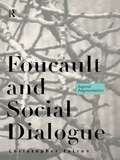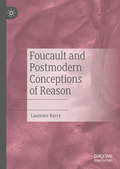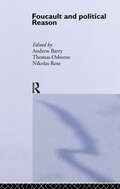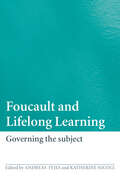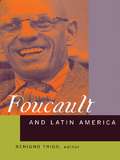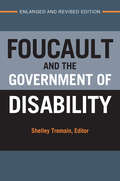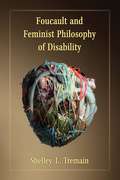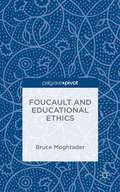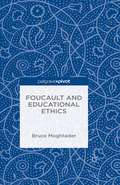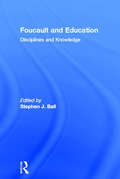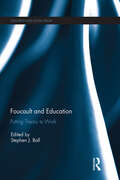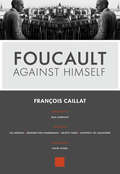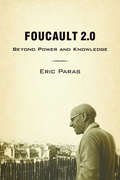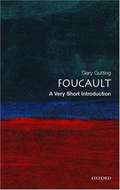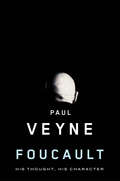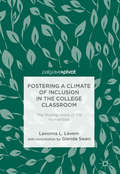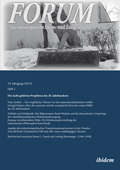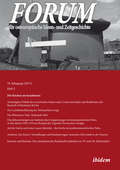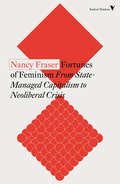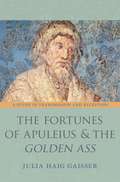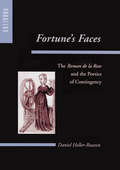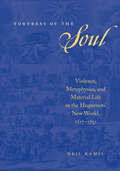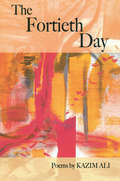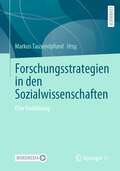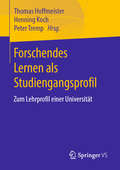- Table View
- List View
Foucault and Social Dialogue: Beyond Fragmentation
by Chris FalzonFoucault and Social Dialogue; Beyond Fragmentation is a compelling yet extremely clear investigation of these options and offers a new way forward. Christopher Falzon argues that the proper alternative to foundationalism is not fragmentation but dialogue and that such a dialogical picture can be found in the work of Michel Foucault. Such a reading of Foucault allows us to see, for the first time, the ethical and political position implicit in Foucault's work and how his work contributes to the larger debate concerning the death of man.
Foucault and Postmodern Conceptions of Reason
by Laurence BarryFor decades Foucault was mostly known for his diagnosis of modernity as a form of entrapment, both in our modes of thought and our behaviors. This book argues that Foucault's reappraisal of modernity occurs with the 1978 and 1979 lectures, in which he sketches modern power as governmentality and neoliberalism. From this perspective, Foucault’s once surprising studies on the Greeks' constitution of the ‘self’ can be seen as a continuation of his diagnosis of late modernity, and as an attempt to retrieve a form of autonomy for our modern selves. One finds in the late Foucault a postmodern conception of reason and not a destruction of reason; but this is possible only if postmodernity is seen as a critical exercise of reason in the analysis of norms.
Foucault And Political Reason: Liberalism, Neo-Liberalism And The Rationalities Of Government
by Nikolas Rose Andrew Barry Thomas OsborneFoucault is often thought to have a great deal to say about the history of madness and sexuality, but little in terms of a general analysis of government and the state.; This volume draws on Foucault's own research to challenge this view, demonstrating the central importance of his work for the study of contemporary politics.; It focuses on liberalism and neo- liberalism, questioning the conceptual opposition of freedom/constraint, state/market and public/private that inform liberal thought.
Foucault and Lifelong Learning: Governing the Subject
by Andreas Fejes Katherine NicollOver the last twenty years there has been increasing interest in the work of Michel Foucault in the social sciences and in particular with relation to education. This, the first book to draw on his work to consider lifelong learning, explores the significance of policies and practices of lifelong learning to the wider societies of which they are a part. With a breadth of international contributors and sites of analysis, this book offers insights into such questions as: What are the effects of lifelong learning policies within socio-political systems of governance? What does lifelong learning do to our understanding of ourselves as citizens? How does lifelong learning act in the regulation and re-ordering of what people do? The book suggests that understanding of lifelong learning as contributory to the knowledge economy, globalisation or the new work order may need to be revised if we are to understand its impact more fully. It therefore makes a significant contribution to the study of lifelong learning.
Foucault and Latin America: Appropriations and Deployments of Discursive Analysis
by Benigno TrigoFoucault and Latin America is the first volume to trace the influence of Foucault's theories on power, discourse, government, subjectivity and sexuality in Latin American thought.
Foucault And The Government Of Disability
by Shelley Lynn TremainFoucault and the Government of Disability considers the continued relevance of Foucault to disability studies, as well as the growing significance of disability studies to understandings of Foucault. A decade ago, this international collection provocatively responded to Foucault's call to question what is regarded as natural, inevitable, ethical, and liberating. The book's contributors draw on Foucault to scrutinize a range of widely endorsed practices and ideas surrounding disability, including rehabilitation, community care, impairment, normality and abnormality, inclusion, prevention, accommodation, and special education. In this revised and expanded edition, four new essays extend and elaborate the lines of inquiry by problematizing (to use Foucault's term) the epistemological, political, and ethical character of the supercrip, the racialized war on autism, the performativity of intellectual disability, and the potent mixture of neoliberalism and biopolitics in the context of physician-assisted suicide. "[A]n important, prescient, and necessary contribution. . . a kind of litmus test for the efficacy of Foucault's concepts in the study of disability, concepts that lead to a refusal of the biological essentialism implied in the disability/impairment binary. " --Foucault Studies "Tremain has done an exceptional job at organizing and procuring important, rigorously argued, and entertaining essays. . . . This book should be a mandatory read for anyone interested in contemporary philosophical debates surrounding the experience of disability. " --Essays in Philosophy "A beautiful exploration of how Foucault's analytics of power and genealogies of discursive knowledges can open up new avenues for thinking critically about phenomena that many of us take to be inevitable and thus new ways of resisting and possibly at times redirecting the forces that shape our lives. Every scholar, every person with an interest in Foucault or in political theory generally, needs to read this book. " --Ladelle McWhorter, University of Richmond
Foucault and Feminist Philosophy of Disability
by Shelley Lynn TremainFoucault and Feminist Philosophy of Disability is a distinctive contribution to growing discussions about how power operates within the academic field of philosophy. By combining the work of Michel Foucault, the insights of philosophy of disability and feminist philosophy, and data derived from empirical research, Shelley L. Tremain compellingly argues that the conception of disability that currently predominates in the discipline of philosophy, according to which disability is a natural disadvantage or personal misfortune, is inextricably intertwined with the underrepresentation of disabled philosophers in the profession of philosophy. Against the understanding of disability that prevails in subfields of philosophy such as bioethics, cognitive science, ethics, and political philosophy, Tremain elaborates a new conception of disability as a historically specifi c and culturally relative apparatus of power. Although the book zeros in on the demographics of and biases embedded in academic philosophy, it will be invaluable to everyone who is concerned about the social, economic, institutional, and political subordination of disabled people.
Foucault and Educational Ethics
by Bruce MoghtaderIn his works on ethics, Foucault turned towards an examination of one's relationship with oneself and others. This differs from the modern approaches that explore the relationship between and the responsibilities of actors to each other by adopting criteria. Ethical criteria engender assumptions about the actors by focusing on their responsibilities. Instead of relying on criteria, Foucault's writing and lectures contributed to an awareness of the activities we take upon ourselves as ethical subjects. His reconstruction of the Greco-Roman ethics seeks to examine the possibilities of the reconstitution and transformation of subjectivity. Through this, he offers an avenue of understanding the formation of ethical subjects in their educational interrelationships.
Foucault and Education: Disciplines and Knowledge (Routledge Library Editions: Michel Foucault)
by Stephen J. BallFirst published in 1990, this book was the first to explore Foucault's work in relation to education, arguing that schools, like prisons and asylums, are institutions of moral and social regulation, complex technologies of disciplinary control where power and knowledge are crucial. Original and challenging, the essays assess the relevance of Foucault's work to educational practice, and show how the application of Foucauldian analysis to education enables us to see the politics of educational reform in a new light.
Foucault and Education: Putting Theory to Work (ISSN)
by Stephen J. BallSpecially selected by Stephen Ball, this is a collection of the best and most interesting recently published papers that ‘use’ Foucault to analyse, destablise and re-claim educational ‘problems’. Arguably the best known social theorist in the western world, Foucault’s work is now widely used by researchers and writers in many fields of social science. These papers not only demonstrate the practical applicability of Foucault to things ‘cracked’ and things ‘intolerable’ in making them ‘not as necessary as all that’; they are also transposable, in that they offer forms and methods of analysis which can be taken up and applied and used in other settings, sectors, and policy fields.
Foucault Against Himself
by Georges Didi-Huberman Arlette Farge Leo Bersani François Caillat Geoffroy De LagasnerieIn his private life, as well as in his work and political attitudes, Michel Foucault often stood in contradiction to himself, especially when his expansive ideas collided with the institutions in which he worked.<P><P> In Francois Caillat's provocative collection of essays and interviews based on his French documentary of the same name, leading contemporary critics and philosophers reframe Foucault's legacy in an effort to build new ways of thinking about his struggle against society's mechanisms of domination, demonstrating how conflict within the self lies at the heart of Foucault's life and work.Includes a foreword written especially for this edition by Paul Rabinow, Professor of Anthropology at the University of California (Berkeley) and an influential writer on the works of Foucault; he is the co-editor of The Essential Foucault.Foucault against Himself features essays and interviews by:Leo Bersani, American Professor Emeritus of French at the University of California (Berkeley) and the author of Homos;Georges Didi-Huberman, French philosopher and art historian; his most recent book is Gerhard Richter: Pictures/SeriesArlette Farge, French historian and the author of The Allure of the Archives;Geoffroy de Lagasnerie, French philosopher and the author of La derniere lecon de Michel Foucault.
Foucault 2.0: Beyond Power and Knowledge
by Eric ParasA dramatically new interpretation of the development of the thought of Michel Foucault, one of the 20th century's most influential thinkers.In this lucid and groundbreaking work, Eric Paras reveals that our understanding of the philosophy of Michel Foucault must be radically revised. Foucault's critical axes of power and knowledge -which purposefully eradicated the concept of free will- reappear as targets in his later work. Paras demonstrates the logic that led Foucault to move from a microphysics of power to an aesthetics of individual experience. He is the first to show a transformation that not only placed Foucault in opposition to the archaeological and genealogical positions for which he is renowned, but aligned him with some of his fiercest antagonists.Foucault 2.0 draws on the full range of the philosopher's writing and of the work of contemporaries who influenced, and sometimes vehemently opposed, his ideas. To fill the gaps in Foucault's published writings that have so far limited our conception of the arc of his thought, Paras analyzes the largely untapped trove of lectures Foucault delivered to teeming Paris audiences as Professor of the College de France for more than a decade. At the same time, Foucault 2.0 highlights the background against which Foucault carried out his most foundational work: the unrest of 1968, the prison reform movement of the early 1970s, and the Iranian Revolution of 1979. Carefully assembling the fragments of a thinker who remains but half-understood, Eric Paras has composed a seminal book, essential reading for novices and initiates alike.
Foucault: A Very Short Introduction
by Gary GuttingFrom aesthetics to the penal system, and from madness and civilization to avantgarde literature, Foucault was happy to reject old models of thinking and replace them with fresh versions that are still being debated today. A major influence on Queer Theory and gender studies (he was openly gay and died of an AIDS-related illness in 1984), he also wrote on architecture, history, law, medicine, literature, politics, and of course philosophy. He even managed to write a best seller in France on a book dedicated to the history of systems of thought. Because he never succinctly stated his arguments, those trying to come to terms with Foucault's work have desperately sought introductory material to make his theories clear and accessible for the beginner. Here, Gary Gutting presents a comprehensive but non-systematic treatment of some highlights of Foucault's life and thought. The book begins with a brief biography to set the social and political stage. It then moves on to touch on Foucault's thoughts on literature, in particular the avantgarde scene, his philosophical and historical work and the reception he received from the historical community, his treatment of knowledge and power in modern society, and his thoughts on sexuality.
Foucault: His Thought, His Character
by Paul VeyneMichel Foucault and Paul Veyne: the philosopher and the historian. Two major figures in the world of ideas, resisting all attempts at categorization. Two timeless thinkers who have long walked and fought together. In this short book Paul Veyne offers a fresh portrait of his friend and relaunches the debate about his ideas and legacy. 'Foucault is not who you think he is', writes Veyne; he stood neither on the left nor on the right and was frequently disowned by both. He was not so much a structuralist as a sceptic, an empiricist disciple of Montaigne, who never ceased in his work to reflect on 'truth games', on singular, constructed truths that belonged to their own time. A unique testimony by a scholar who knew Foucault well, this book succeeds brilliantly in grasping the core of his thought and in stripping away the confusions and misunderstandings that have so often characterized the interpretation of Foucault and his work.
Fostering a Climate of Inclusion in the College Classroom: The Missing Voice Of The Humanities
by Lavonna L. Lovern Glenda SwanThis book examines inclusion teaching at the college and university level. It establishes the importance of the Humanities disciplines and the use of qualitative analysis as a means of understanding and encouraging democratic materials and classroom organization. The first section of the text provides two primers for those unfamiliar with pedagogical history and theory. These primers are designed to give basic information and sources for additional study. They trace pedagogical influences from foundationism, neoliberalism, conflict, and critical theories to critical race theory, Red pedagogy, and decolonization theories. The second half of the book focuses on strategies to assist those attempting classroom inclusion. These chapters are designed to assist with practical ways in which inclusion can be advanced as well as strategies to assist junior faculty in the navigation of the politics of inclusive education.
Forum für osteuropäische Ideen- und Zeitgeschichte: Die Kirchen im Sozialismus am Beispiel Russlands und Polens
by Nikolaus Lobkowicz Leonid Luks Alexei Rybakov Gunter Dehnert John Andreas Fuchs Andreas UmlandSince 1997, FORUM has been an integral part of the landscape of European studies. In addition to contemporary history, it offers insights into the history of ideas and reviews books on Central and Eastern European history. It offers more than just history—for instance, interdisciplinary discussions by political scientists, literary, legal, and economic scholars, and philosophers. FORUM sees itself as a bridge between East and West. Through the translation and publication of texts and contributions from Russian, Polish, and Czech researchers, it offers the Western reader access to the scholarly discourse of Eastern Europe.The 'short' 20th century is one of the best-documented eras in history. Nevertheless, it holds more mysteries than many periods of antiquity or the Middle Ages of which we have only sparse relics. One of the biggest mysteries is the question of the causes of the collapse of civilization in the first half of the century. In Germany as well as in Russia, regimes came to power invoking the implementation of utopias that had been dreamt up during the 'long' 19th century yet which had been considered unrealizable. Now, it turned out, even the most radical utopian blueprint could be put into place. This development, intertwined with an extraordinarily deep crisis of European democracy, did not happen overnight. It had been looming for a long time. There had even been several prescient voices heralding the upcoming crisis—trailing away without being noticed. Volume 19, Issue 1 of FORUM recognizes some of these unheard prophets and scrutinizes their writings.
Forum für osteuropäische Ideen- und Zeitgeschichte: Die Kirchen im Sozialismus am Beispiel Russlands und Polens
by Leonid Luks Gunter Dehnert John Andreas Fuchs Nikolaus Lobkowicz Alexei Rybakow und Andreas UmlandSince 1997, FORUM has been an integral part of the landscape of European studies. In addition to contemporary history, it offers insights into the history of ideas and reviews books on Central and Eastern European history. It offers more than just history—for instance, interdisciplinary discussions by political scientists, literary, legal, and economic scholars, and philosophers. FORUM sees itself as a bridge between East and West. Through the translation and publication of texts and contributions from Russian, Polish, and Czech researchers, it offers the Western reader access to the scholarly discourse of Eastern Europe.This issue examines the fate of organized religion under state socialism. While totalitarianism means a rupture in the traditional idea of man, the church stands for continuity. That is why totalitarian rulers quest to expel the church from public perception and, at the same time, try to usurp the church from within. This volume is dedicated to investigating how this process took place in the countries of the former Soviet bloc.
Fortunes of Feminism
by Nancy FraserNancy Fraser's major new book traces the feminist movement's evolution since the 1970s and anticipates a new--radical and egalitarian--phase of feminist thought and action.During the ferment of the New Left, "Second Wave" feminism emerged as a struggle for women's liberation and took its place alongside other radical movements that were questioning core features of capitalist society. But feminism's subsequent immersion in identity politics coincided with a decline in its utopian energies and the rise of neoliberalism. Now, foreseeing a revival in the movement, Fraser argues for a reinvigorated feminist radicalism able to address the global economic crisis. Feminism can be a force working in concert with other egalitarian movements in the struggle to bring the economy under democratic control, while building on the visionary potential of the earlier waves of women's liberation. This powerful new account is set to become a landmark of feminist thought.
The Fortunes of Apuleius and the Golden Ass: A Study in Transmission and Reception (Martin Classical Lectures #32)
by Julia Haig GaisserThis book traces the transmission and reception of one of the most influential novels in Western literature. The Golden Ass, the only ancient Roman novel to survive in its entirety, tells of a young man changed into an ass by magic and his bawdy adventures and narrow escapes before the goddess Isis changes him back again. Its centerpiece is the famous story of Cupid and Psyche. Julia Gaisser follows Apuleius' racy tale from antiquity through the sixteenth century, tracing its journey from roll to codex in fourth-century Rome, into the medieval library of Monte Cassino, into the hands of Italian humanists, into print, and, finally, over the Alps and into translation in Spanish, French, German, and English. She demonstrates that the novel's reception was linked with Apuleius' reputation as a philosopher and the persona he projected in his works. She relates Apuleius and the Golden Ass to a diverse cast of important literary and historical figures--including Augustine, Fulgentius, Petrarch, Boccaccio, Bessarion, Boiardo, and Beroaldo. Paying equal attention to the novel's transmission (how it survived) and its reception (how it was interpreted), she places the work in its many different historical contexts, examining its representation in art, literary imitation, allegory, scholarly commentary, and translation. The volume contains several appendixes, including an annotated list of the manuscripts of the Golden Ass. This book is based on the author's Martin Classical Lectures at Oberlin College in 2000.
Fortune's Faces: The Roman de la Rose and the Poetics of Contingency (Parallax: Re-visions of Culture and Society)
by Daniel Heller-RoazenArguably the single most influential literary work of the European Middle Ages, the Roman de la Rose of Guillaume de Lorris and Jean de Meun has traditionally posed a number of difficulties to modern critics, who have viewed its many interruptions and philosophical discussions as signs of a lack of formal organization and a characteristically medieval predilection for encyclopedic summation. In Fortune's Faces, Daniel Heller-Roazen calls into question these assessments, offering a new and compelling interpretation of the romance as a carefully constructed and far-reaching exploration of the place of fortune, chance, and contingency in literary writing.Situating the Romance of the Rose at the intersection of medieval literature and philosophy, Heller-Roazen shows how the thirteenth-century work invokes and radicalizes two classical and medieval traditions of reflection on language and contingency: that of the Provençal, French, and Italian love poets, who sought to compose their "verses of pure nothing"in a language Dante defined as "without grammar," and that of Aristotle's discussion of "future contingents" as it was received and refined in the logic, physics, theology, and epistemology of Boethius, Abelard, Albert the Great, and Thomas Aquinas.Through a close analysis of the poetic text and a detailed reconstruction of the logical and metaphysical concept of contingency, Fortune's Faces charts the transformations that literary structures (such as subjectivity, autobiography, prosopopoeia, allegory, and self-reference) undergo in a work that defines itself as radically contingent. Considered in its full poetic and philosophical dimensions, the Romance of the Rose thus acquires an altogether new significance in the history of literature: it appears as a work that incessantly explores its own capacity to be other than it is.
Fortress of the Soul: Violence, Metaphysics, and Material Life in the Huguenots' New World, 1517-1751 (Early America: History, Context, Culture)
by Neil KamilFrench Huguenots made enormous contributions to the life and culture of colonial New York during the seventeenth and eighteenth centuries. Huguenot craftsmen were the city's most successful artisans, turning out unrivaled works of furniture which were distinguished by unique designs and arcane details. More than just decorative flourishes, however, the visual language employed by Huguenot artisans reflected a distinct belief system shaped during the religious wars of sixteenth-century France.In Fortress of the Soul, historian Neil Kamil traces the Huguenots' journey to New York from the Aunis-Saintonge region of southwestern France. There, in the sixteenth century, artisans had created a subterranean culture of clandestine workshops and meeting places inspired by the teachings of Bernard Palissy, a potter, alchemist, and philosopher who rejected the communal, militaristic ideology of the Huguenot majority which was centered in the walled city of La Rochelle. Palissy and his followers instead embraced a more fluid, portable, and discrete religious identity that encouraged members to practice their beliefs in secret while living safely—even prospering—as artisans in hostile communities. And when these artisans first fled France for England and Holland, then left Europe for America, they carried with them both their skills and their doctrine of artisanal security.Drawing on significant archival research and fresh interpretations of Huguenot material culture, Kamil offers an exhaustive and sophisticated study of the complex worldview of the Huguenot community. From the function of sacred violence and alchemy in the visual language of Huguenot artisans, to the impact among Protestants everywhere of the destruction of La Rochelle in 1628, to the ways in which New York's Huguenots interacted with each other and with other communities of religious dissenters and refugees, Fortress of the Soul brilliantly places American colonial history and material life firmly within the larger context of the early modern Atlantic world.
The Fortieth Day (American Poets Continuum)
by Kazim AliFrom the Bible to the Quaraan, the fortieth day symbolizes the last moment before deliverance, a moment in time when a supplicant or prophet or stormbeaten passenger knows there is no state &“after,&” but finally accepts the present state as a permanent one.In The Fortieth Day, Kazim Ali follows the fractured narratives and moving lyrics of his debut collection, The Far Mosque, with a deeply spiritual and meditative book exploring the rhetoric of prayer.Kazim Ali was born in the United Kingdom and raised in an Islamic household. He holds degrees from the University at Albany and New York University. He lives in Oberlin, Ohio.
Forschungsstrategien in den Sozialwissenschaften: Eine Einführung
by Markus TausendpfundTrotz unterschiedlicher Themen und Fragestellungen sind Forschende und Studierende bei der Durchführung eines Forschungsprojekts immer wieder mit vergleichbaren Herausforderungen konfrontiert: eine relevante Forschungsfrage muss entwickelt und der meist umfangreiche Forschungsstand prägnant präsentiert werden. Daran anknüpfend müssen die zentralen Konzepte eines Forschungsprojekts spezifiziert und valide Operationalisierungen dieser Konzepte entwickelt werden. Schließlich müssen Untersuchungsobjekte ausgewählt und die geeignete Untersuchungsmethode festgelegt werden. Dieser Band behandelt die typischen Herausforderungen eines sozialwissenschaftlichen Forschungsprojekts und bietet Informationen, um diese Herausforderungen (besser) meistern zu können.
Forschendes Lernen als Studiengangsprofil: Zum Lehrprofil einer Universität
by Thomas Hoffmeister Henning Koch Peter Tremp„Universität des Forschenden Lernens“: Mit diesem Anspruch hat die Universität Bremen in den letzten Jahren ihre Lehrangebote und damit ihr Lehrprofil weiterentwickelt. Die Publikation präsentiert anregende Beispiele und konkretisierende Hinweise zur Umsetzung dieses Postulats. Erörtert werden Modelle und Konzeptionen des Forschenden Lernens als Studiengangsprofil, diskutiert werden Möglichkeiten der Übertragbarkeit. Die Publikation leistet damit einen praxisorientierten Beitrag zur Curriculumentwicklung an Hochschulen und nimmt Fragen auf, die sich an allen Hochschulen mit grosser Dringlichkeit stellen.
